-
The Connection Between Your Dental Health and Vision
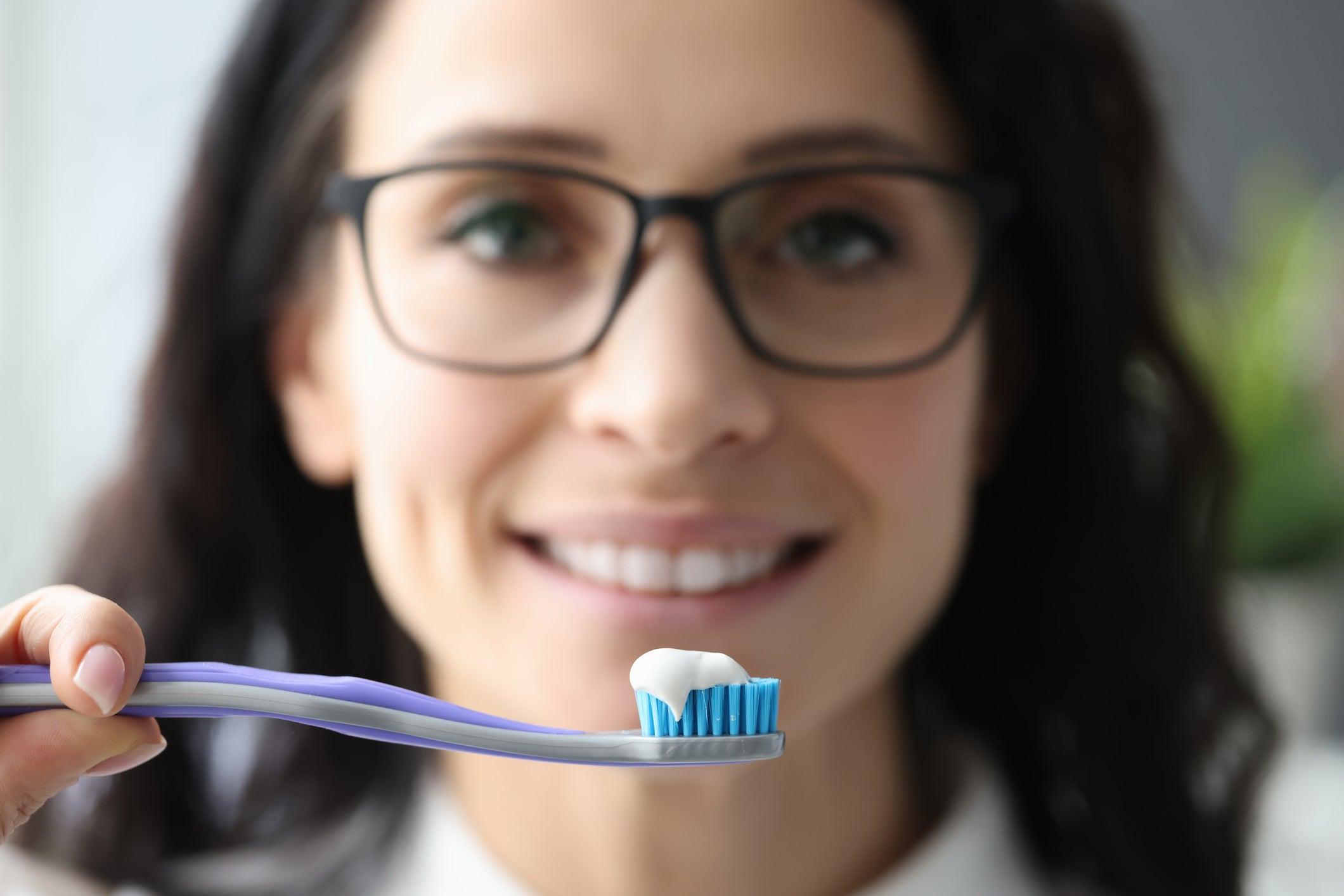
You care for your teeth to keep them healthy and strong, but, as you may know, poor dental health can negatively affect other systems in your body. There is a connection between diabetes and gum disease, for instance, and bacteria from tooth decay can impact your heart health. What you may not realize, though, is that there is a connection between your dental health and your vision. Could caring for your teeth actually protect your vision?
What is the connection between oral health and eye health? According to the American Academy of Ophthalmology, oral infections, including periodontal disease, cause an inflammatory response that can damage the optic nerve and cause vision loss. Additionally, people who have old mercury fillings may be at risk for vision problems that include iritis, color-vision issues, retinitis pigmentosa, and the formation of cataracts.
Poor dental hygiene is also known to contribute to the development of open-angle glaucoma. A degenerative eye disease, open-angle glaucoma results from increased fluid build-up in the eye that places damaging pressure on the optic nerve. Left untreated, this condition can cause vision loss and even blindness. One recent study found that the number of natural teeth a person has, an indication of the person’s dental care, is related to the risk of developing glaucoma.
While seeing an eye doctor is important for keeping your eyes healthy, it seems to be just as important to practice good dental habits. These habits include brushing teeth at least twice a day and flossing at least once, rinsing daily with an anti-bacterial mouthwash, having old fillings replaced with safer materials, and seeing a dentist for gingivitis treatment or a root canal for a badly diseased tooth. Eating a nutrient-dense diet and avoiding unhealthy practices like smoking and using your teeth for things unrelated to chewing food are also healthy habits. It is also a good practice to see a dentist twice a year for preventative cleanings and follow-up exams.
One of the most important factors when it comes to caring for your teeth is finding a good dentist. At Park 56 Dental Group, we offer pediatric, prosthodontics, endodontics, oral surgery, Invisalign®, emergency, and sedation dentistry, all at the highest level of treatment. We serve the Midtown, Central Park, Upper East Side, Park Avenue, and all surrounding Manhattan and New York areas, with a patient-centered practice that has hours to fit your schedule. Schedule your complimentary consultation today by contacting us online or calling us at (212) 826-2322.
-
Does menopause affect your oral health?
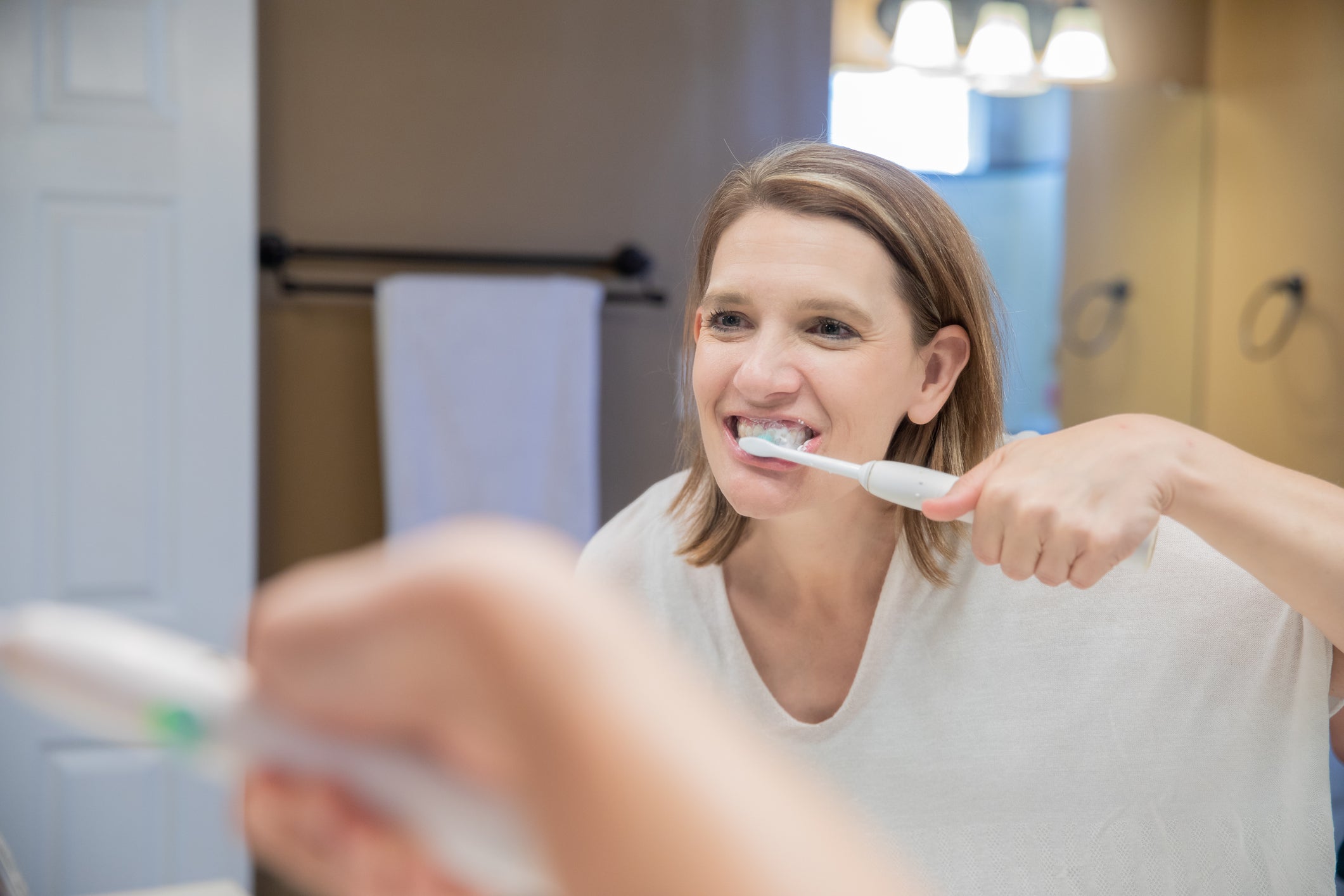
Menopause is a time of life that brings many unpleasant surprises. Hot flashes, insomnia, and mood swings are some of the commonly known symptoms that affect women going through this stage. Less known is the impact of fluctuating hormone levels on the mouth, but there definitely seems to be a link. As estrogen levels decrease during perimenopause and menopause, many women notice sensitive teeth, painful gums, dry mouth, and other issues.
- Hormonal fluctuations can cause tooth sensitivity. If you often find that your teeth hurt after you eat or drink hot or cold things, you may have sensitive teeth. This condition happens when the inner part of the teeth, the dentin, lose their enamel and cementum coatings, leaving the nerves inside vulnerable.
- Gum inflammation is another side effect of menopause. Women going through menopause might experience gingivostomatitis, an oral health condition that causes gum inflammation and canker sores. Periodontal disease can also develop due to low estrogen levels, leading to gum inflammation, bright red or purple gums, gum tenderness and bleeding, receding gums, pus formation, bad breath, bite issues, and loose teeth or gaps between the teeth. Interestingly, another problem that often occurs with menopause is lowered bone density, which can cause bone loss in the jawbone. The treatment for this condition often includes bisphosphonate drugs, which also help prevent the progression, of periodontal disease. Your dentist or periodontist can also treat periodontal disease by scaling to remove tarter, prescribing antimicrobial oral rinses or oral antibiotics, or performing flap surgery. For severe disease, bone or tissue grafts may be necessary. Practicing impeccable oral hygiene is a major part of controlling periodontal disease, and so is quitting smoking.
- Changes in hormone levels can change the way food tastes. Salty, sour, or peppery foods bother some women, and food can sometimes taste unusually bitter or metallic. Sometimes, these menopause-related taste changes are accompanied by a condition known as burning mouth. As the name implies, burning mouth causes burning, pain, and tenderness around the mouth, including the lips tongue, and cheeks.
- Tooth pain can be caused by menopausal changes. For example, declining estrogen levels can decrease the thickness of the oral mucosal epithelium, leading to greater sensitivity to pain and higher vulnerability to mouth infections.
- Dropping hormones can cause dry mouth. Hormones help support saliva production and maintain the consistency of the saliva, but lower levels of estrogen can decrease your mouth’s ability to produce saliva. Dry mouth makes it uncomfortable to eat, but it can also cause gum sensitivity, mouth ulcers, sore gums, an increase in infections, and cavities.
Often, doctors prescribe hormone replacement therapy to help combat the signs of menopause. However, it’s also important to work with your dentist to keep your oral health in good shape. Regular cleanings and check-ups, brushing and flossing daily, taking supplements like calcium and vitamin D, and using products to treat sensitive teeth and dry mouth can all be part of maintaining oral health during menopause. It’s also important to have a good dentist.
At Park 56 Dental Group, we offer pediatric, prosthodontics, endodontics, oral surgery, Invisalign®, emergency, and sedation dentistry, all at the highest level of treatment. We serve the Midtown, Central Park, Upper East Side, Park Avenue, and all surrounding Manhattan and New York areas, with a patient-centered practice that has hours to fit your schedule. Schedule your complimentary consultation today by contacting us online or calling us at (212) 826-2322.
-
How Staying Hydrated Can Help Improve Your Dental Health

You hear it from everyone: drink more water. Experts advise drinking about eight glasses of water each day to help improve your health. Water is good for you for many reasons; it helps you detox, keeps your skin plump, youthful, and clear, and may even reduce your risk of certain cancers. It helps just about every system in the body, from your circulation to your muscles, and it’s no wonder, because we’re made of about 60 percent water. What you may not know, though, is that in addition to all those benefits, remaining well hydrated can improve your dental health. Let’s take a closer look at why that’s true.
- Water strengthens teeth. Water, especially fluoridated water, contains fluoride and other minerals that help restore the calcium and phosphorous levels in dental enamel. Did you know that in communities with fluoridated water, each dollar spent on fluoridation saves about $38 in dental healthcare costs? Drinking water is especially important for young children because it strengthens teeth as they are forming, making them more cavity-resistant throughout the child’s life.
- Drinking water helps clean the mouth. Drinking sugary beverages like soda, sports drinks, and juice can cause sugars to remain on the surface of the teeth. This leads to growth of the bacteria in plaque, which release harmful acids that degrade tooth enamel and cause decay. Drinking water, on the other hand, washes away food residue and discourages bacterial growth. Because food residue and bacteria cause bad breath, people who drink a lot of water have better smelling breath. Drinking water isn’t a substitute for brushing and flossing, but it can be an important part of your dental care routine.
- Dry mouth can be alleviated by drinking water. This makes sense, because saliva is 99 percent water. Dry mouth is a condition in which the mouth does not produce enough saliva, making it harder to chew and swallow, and causing an elevated risk of tooth decay. Drinking water hydrates the mouth and stimulates saliva production, making it a powerful weapon against dry mouth.
- Water can help prevent stains on the teeth. Foods and beverages like coffee, tomato sauce, wine, curry, and citrus fruits can leave behind stains, but drinking water in between bites or sips can quickly rinse away residue before it has the chance to settle into a stain.
- Water is a calorie free beverage. Consumption of sugary beverages contributes to the rising obesity rate in the United States, and people who drink more than one sugary beverage per day are nearly 30 percent more likely to develop type 2 diabetes. Water has no calories and no sugar, making it a much healthier option.
At Park 56 Dental Group, we offer pediatric, prosthodontics, endodontics, oral surgery, Invisalign®, emergency, and sedation dentistry, all at the highest level of treatment. We serve the Midtown, Central Park, Upper East Side, Park Avenue, and all surrounding Manhattan and New York areas, with a patient-centered practice that has hours to fit your schedule. Schedule your complimentary consultation today by contacting us online or calling us at (212) 826-2322.
-
Do Genetics Play a Role in Your Dental Health?

At Park 56 Dental, we understand that genetics play a role in your overall health, but did you know that it also plays a role in your dental health? While good oral hygiene habits can go a long way towards protecting your teeth and gums, genetics determine how predisposed you are to certain dental issues. Let’s break down the role of genetics in dental health.
Dental Caries
One of the most common dental problems is tooth decay or cavities. Cavities can be caused by poor oral hygiene habits, but they can also be a result of genetic factors. Studies have found that some people may develop more cavities than others due to their genetic makeup. For example, if you have a family history of cavities, then you may be more likely to develop them yourself.
Tooth Wear and Tear
In addition to cavities, tooth wear and tear can also be affected by genetics. Some people may be genetically predisposed to having weaker teeth than others which make them more prone to experiencing wear and tear earlier in life. This is especially true for those with thinner enamel which makes it harder for their teeth to withstand the pressures of daily activities like chewing and grinding.
Misaligned Teeth
One of the most common effects of genetics on oral health is misaligned (crooked) teeth. In many cases, crooked teeth are caused by genetic factors such as jaw size and shape, or even a difference in the length of two sides of the jaw. If you have crooked teeth, Park 56 Dental in New York can help with orthodontic treatments like braces and Invisalign® to help straighten them out.
Teeth Color
The color of your teeth is another trait that can be influenced by genetics. Some people have naturally whiter teeth than others due to inherited traits, while others may have naturally yellowish or grayish tints to their smile due to genetics as well. Park 56 Dental offers professional whitening services that can help brighten up any shade of smile.
Periodontal Disease
Genetics can also play a role in periodontal (gum) disease as well as other diseases such as diabetes and cancer that may affect your oral health. If you have any family members who have experienced gum disease or other serious dental problems, then you may be at an increased risk for developing these issues as well. It is important to keep track of any family history related to your dental health so that you can take steps to prevent any potential problems from occurring.
Reach Out to Park 56 Dental to Protect Your Smile!
The bottom line is that genetics do play a role in your dental health, but good oral hygiene habits are still important for keeping your teeth and gums healthy. So, if you want to protect yourself from potential dental problems down the road, make sure you brush twice daily, floss once daily, rinse with an antiseptic mouthwash regularly and visit Park 56 Dental at least twice a year for check-ups and cleanings! By taking these steps now, you’ll ensure that your smile remains healthy for many years to come!
-
Are Water Flossers Worth It?
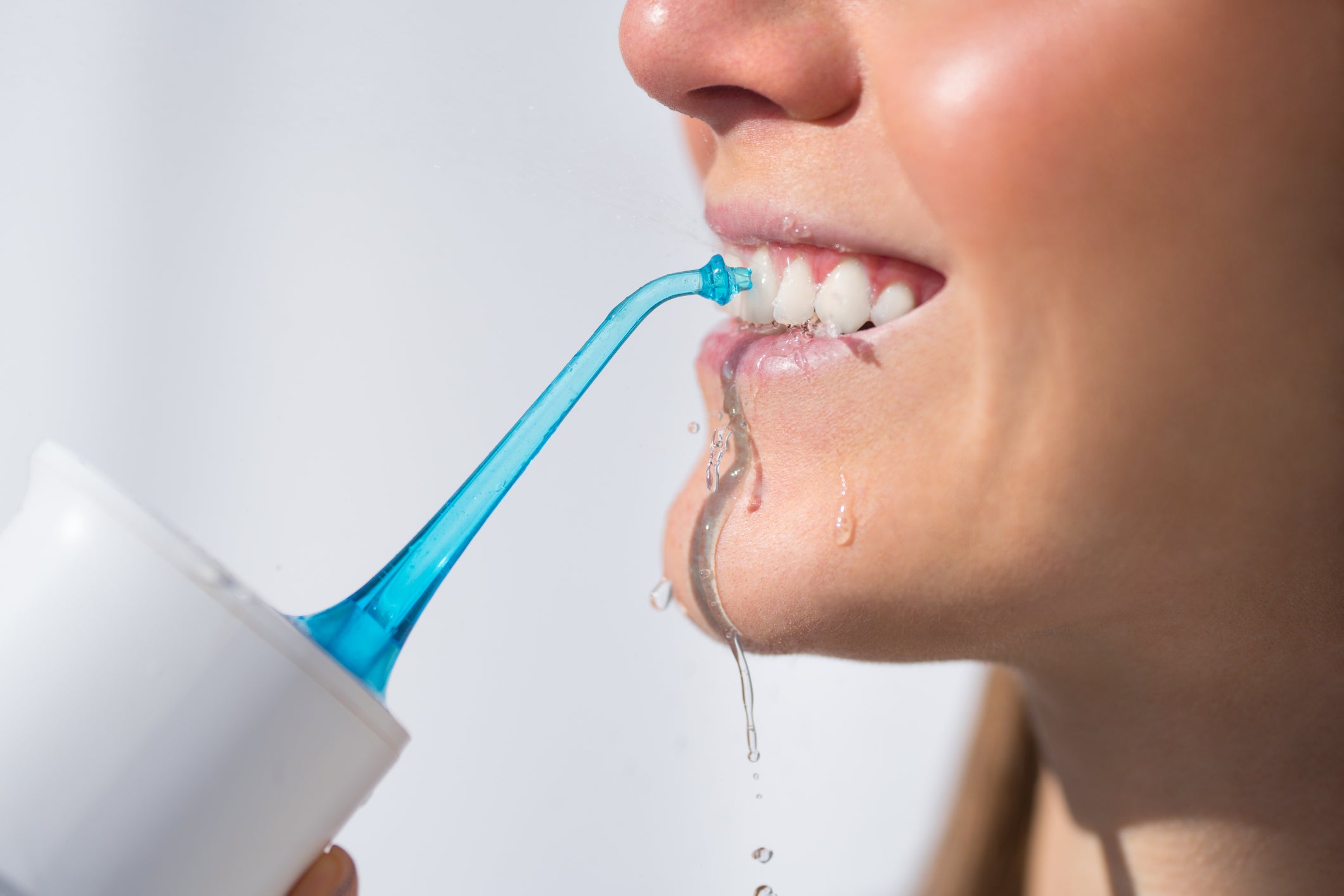
If you’re looking for an effective way to improve your oral health, you may have heard about water flossers. But are they really worth it? Here at Park 56 Dental in New York, we can tell you the answer is yes. Let’s look at exactly why water flossers are so helpful and how they can make a difference in your smile.
What is a Water Flosser?
A water flosser is an oral hygiene device that uses pulsating streams of water to remove plaque, bacteria, and food particles from between teeth and under the gum line. It is often used as an alternative to traditional string flossing or floss picks for those who find it difficult to use them effectively.
Water Flossers Have the ADA Seal of Acceptance
Get your oral health on the right track by choosing a water flosser with the ADA Seal of Acceptance! With proven safety and effectiveness, these products can help reduce plaque buildup that leads to cavities and gum disease. Plus, they have been clinically tested to lower gingivitis–so you get fresh breath all day long no matter where you are in your smile journey! Check out this list for recommended ADA-Accepted water flossers.
Benefits of Water Flossing
Take your dental hygiene routine to the next level by adding water flossing to your routine. Water flossers are a revolutionary device that provide numerous benefits over traditional flossing:
- Improved Gum Health – Studies have shown that water flossers are significantly more effective at preventing gum disease than traditional string floss. This is because they deliver a steady stream of water directly into hard-to-reach areas of the mouth, making it easier to remove plaque and food particles from between the teeth and gums.
- Reduced Bleeding – Traditional string floss can cause your gums to bleed if used incorrectly or too aggressively, but this isn’t an issue with water flossers. The pressure from the stream of water is gentle enough that it won’t aggravate sensitive gums, and yet still powerful enough to remove plaque and food particles from between the teeth and gums.
- Time Savings – Traditional string floss takes time—sometimes up to 10 minutes—but with a water flosser, you can clean your entire mouth in just 60 seconds! This makes it much easier to fit into even the busiest of schedules.
- Versatility – Unlike traditional string floss, which can only be used on teeth, water flossers can be used anywhere in the mouth—including between teeth, along the gum line, and even on bridges and braces! It even comes with a variety of tip attachments for different types of cleaning needs (e.g., plaque removal, stain removal).
- Cost Savings – Although they may seem expensive upfront, when you factor in how much time they save you in your daily oral care routine, their cost quickly balances out over time since you don’t need to buy new supplies as often as with traditional string floss. Plus, since they last longer than regular string floss, there is less waste overall too!
We hope this article has helped you understand why using a water flosser is such an important part of any good oral hygiene routine! If you’re interested in learning more about how a water flosser can help improve your smile, please don’t hesitate to contact us here at Park 56 Dental in New York today! We look forward to helping you achieve the best possible results for your mouth and teeth!
-
How Regular Dental Visits Can Help Fight Diabetes
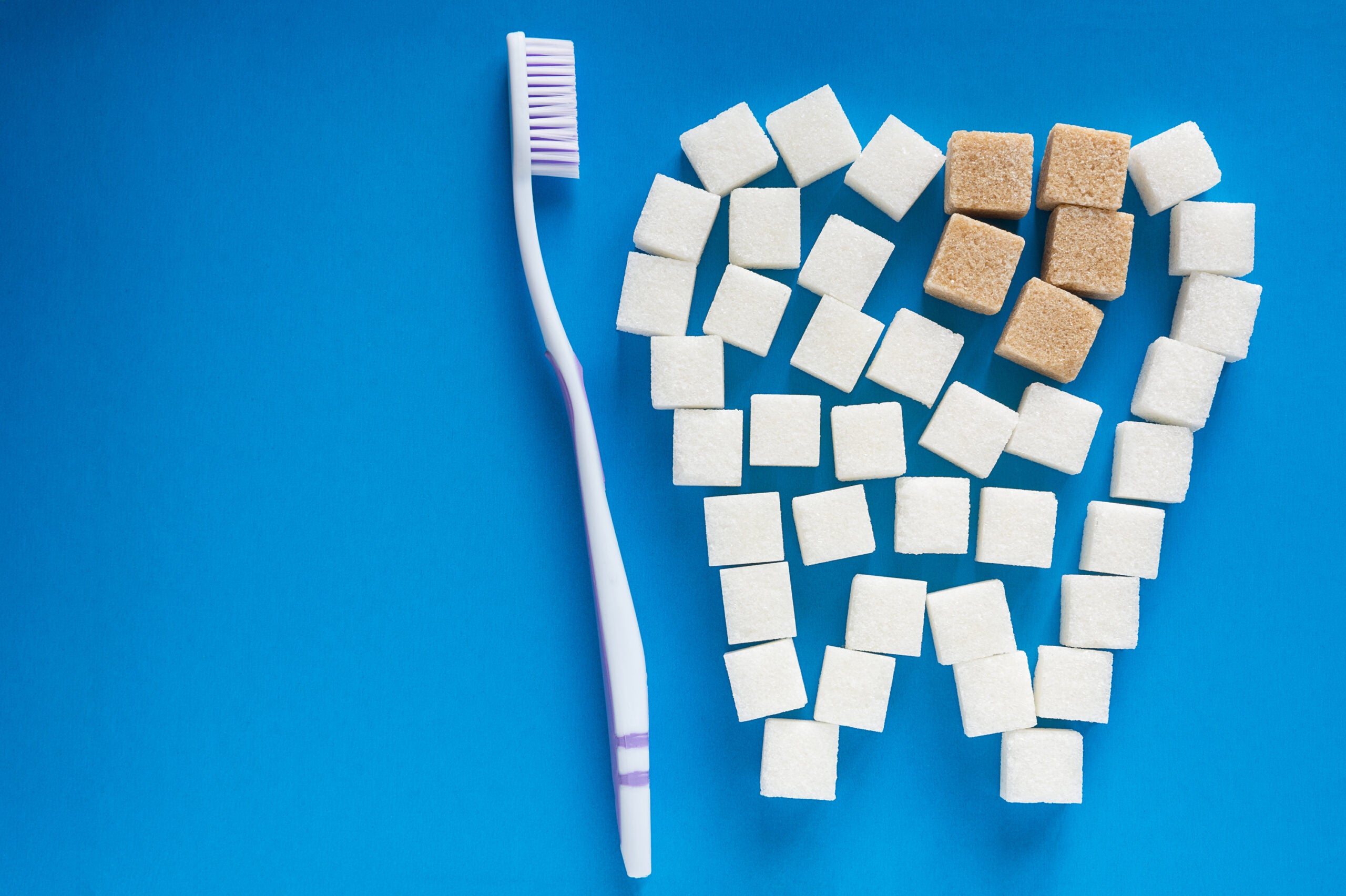
Diabetes is a serious disease that affects millions of people worldwide. While it is primarily managed through diet and medication, recent studies have shown that there may be another important factor–dental health. Regular dental visits can help to manage diabetes, as well as prevent the onset of diabetes in those who are at risk. Let’s take a closer look at how regular dental visits can help fight diabetes.
The Connection Between Oral Health and Diabetes
There is a strong connection between oral health and diabetes. When someone has poor oral hygiene, their chances of developing diabetes increase significantly. Poor oral hygiene can also lead to high blood sugar levels, which can worsen symptoms of existing diabetes. Regular dental visits are critical for those with diabetes because they allow dentists to identify potential problems early on so that they can be addressed before they become serious issues.
Oral Conditions Diabetes Can Cause or Worsen
Diabetes is a long-term condition that affects the body’s ability to produce or effectively use the hormone insulin. Unfortunately, diabetes can severely affect our oral health. Specifically, diabetes causes a decrease in saliva flow due to damaged salivary glands which can lead to an increase in dental cavities and gum inflammation. Additionally, diabetes prevents oxygen delivery resulting in delicate blood vessels that may break more easily causing dry mouth, recurrent infections and even delayed healing of wounds which can encourage overgrowth of bacteria. Therefore, people with diabetes need to pay close attention to their oral hygiene habits by brushing and flossing regularly, visiting the dentist twice a year for cleanings and professional checkups and reducing consumption of sweet substances to help manage diabetes related oral complications.
Regular Check-Ups Help Identify Potential Problems
Regular dental check-ups provide an opportunity for dentists to screen for signs of periodontal disease or other conditions that could indicate the onset of diabetes. For example, during a check-up your dentist may be able to spot signs of gum disease, which is linked to an increased risk for Type 2 diabetes. By identifying these potential issues early on, your dentist can work with you to develop an appropriate treatment plan and lifestyle changes that will help improve your overall wellbeing.
Good Oral Hygiene Can Help Manage Diabetes Symptoms
Good oral hygiene is essential for preventing the onset of Type 2 diabetes and managing the symptoms of existing cases. Brushing at least twice daily with fluoride toothpaste helps remove bacteria from teeth while flossing helps keep gums healthy by removing food particles stuck in between teeth where brushing cannot reach them. Additionally, limiting sugary snacks and drinks such as soda and processed foods will help lower blood sugar levels, which in turn reduces the risk for developing complications related to diabetes such as nerve damage or blindness.
Come Visit Park 56 Dental Today!
At Park 56 Dental in New York City we understand the importance of good dental hygiene in managing diabetes symptoms and preventing its onset. Our team specializes in providing preventive care services designed to detect any signs or symptoms associated with either condition before they become serious problems. We recommend scheduling regular check-ups so that our team can monitor your oral health closely and recommend any lifestyle changes if necessary. Contact us today to learn more about our services!
-
Simple Ways to Motivate You to Floss Every Day
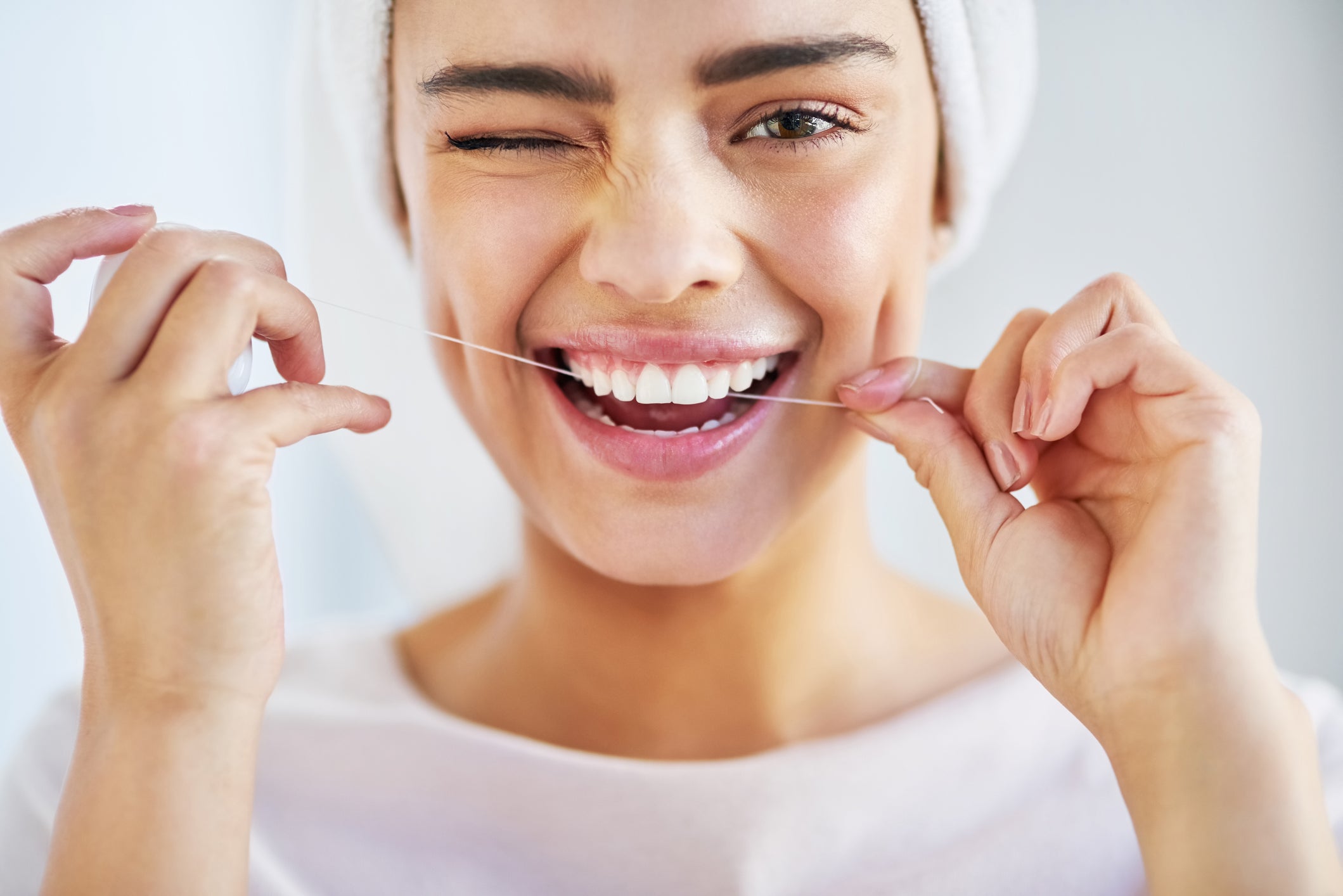
Good oral hygiene is important for a healthy mouth, and one of the most effective ways to achieve it? That’s right—flossing! Flossing is one of the most important habits you can adopt to maintain good oral health. According to research, only 4 out of 10 adults floss daily and only 1 in 3 actually flosses correctly. Daily flossing helps prevent cavities, gum disease, and bad breath. But sometimes it’s hard to remember to do it every day. So here are some simple motivators that might help you get into the habit of regular flossing.
Find a Flossing Product That Works for You
The type of floss you use matters! Many people don’t realize that different types of floss work differently for different types of teeth and mouth needs. Waxed, non-waxed, disposable floss sticks, electric or water flossers—there are so many options available! If one type of product isn’t working well with your teeth and gums, try another! Experiment with different products until you find the perfect one for your personal oral hygiene routine.
Keep Your Floss in Sight
If you have your dental floss handy, you are more likely to remember to use it every day! Try keeping an extra package at the office or even in your pocket or purse wherever you go. You should also keep a container on the sink or bathroom countertop as a constant reminder that it’s time to floss every day!
Set A Goal
One of the best ways to make sure you stick with something is to set a goal. Make a goal that you can realistically achieve, like “I will floss at least twice a week for the next month.” Once you reach that goal, reward yourself by doing something special or purchasing something nice! This will help motivate you to keep going and eventually make daily flossing part of your routine.
Create A Chart
If setting goals isn’t quite your thing, another way to motivate yourself is by creating a chart or calendar that tracks your progress. Every day after you floss, mark it off in your chart or on your calendar as a reminder that you achieved your goal for the day. Seeing this progress can give you an added boost of motivation and encouragement!
Use A Reminder App
If neither of these methods seem like they’d work for you, consider downloading a reminder app onto your phone or laptop. With this type of app, all you have to do is set the time when you want it to remind you each day–it could be right before bedtime, so it becomes part of your nighttime routine–and then just follow through with the action when the reminder goes off!
Get Flossing!
Flossing every day is an important part of maintaining good oral hygiene and overall health. And while remembering to do it can be difficult at times, there are several easy strategies available that can help motivate and remind us so that we don’t forget! Whether it’s setting goals and rewarding yourself for reaching them, using visuals like charts and calendars, or using apps on our phones for reminders—these simple strategies can help ensure we stick with our daily flossing routine.
If any questions remain about flossing or other dental-related topics such as teeth whitening services offered at Park 56 Dental in New York City, please contact us today!
-
Understanding Your Gums
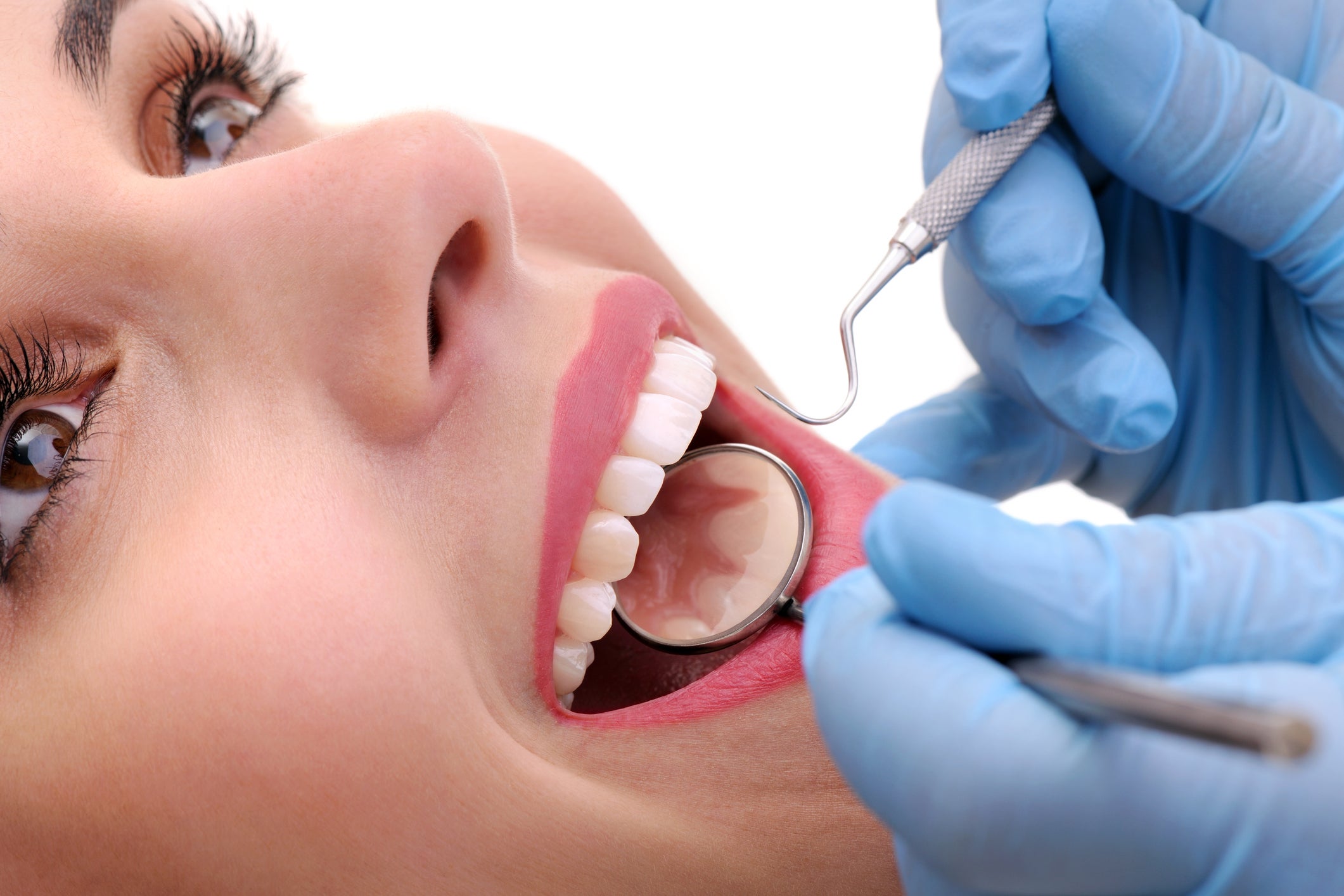
You know about cavities, and tooth decay, and how important it is to brush and keep your teeth healthy. But how much do you know about the health of your gums? The gums are an important part of your mouth, and if they’re not in good shape, your whole mouth can suffer. What do you need to know about your gums?
You might have noticed that your oral hygienist or dentist probes your gums during your regular check-ups. This is to determine if your gums are fitting snugly against your teeth. Unhealthy gums have pockets of space, and the deeper the pocket, the worse your gum health. It may feel like your gums are just being poked, but what the dentist is actually doing is measuring them. The tool used to probe gums is called a periodontal probe, and it’s essentially a tiny ruler. It is inserted into pockets in your gums, and the depth is recorded in millimeters.
Your dentist will keep track of these numbers as a preventive measure against periodontal disease (gum disease). Only your dentist can diagnose gum disease, but in general, 1 to 3 mm means the gums are generally healthy, 4 mm means you need to pay more attention to your oral care, 5 to 6 mm indicates gum disease, and anything over 6 means advanced gym disease. By regularly checking gum pocket depth, your dental team can catch periodontal disease early, when it’s still relatively easy to treat.
You can look for signs of gum disease at home, too. Swollen, sore, or bleeding gums could be a sign of gingivitis or periodontal disease. Gingivitis is the early stage of gum disease, and it happens when plaque builds up at the gumline. Once it progresses to periodontitis, it can affect the bone and tissue supporting your teeth. However, these symptoms can also be caused by other conditions and even vitamin deficiencies. Hormonal changes like pregnancy, illnesses like diabetes, infections, and vitamin C deficiency can all be responsible for gum problems, so you will want to see your dentist to get the right diagnosis.
What can you do to keep your gums healthy? First, pay attention to your oral care routine. Brush twice a day and floss once a day, brushing gently so that you don’t injure your gums. Consider using a water flosser, to clean below the gumline. Eat a nutritious diet, don’t use tobacco products, drink alcohol only in moderation, and take supplements, especially if you think you are not getting enough vitamin C. See your dentist for regular check-ups and cleanings, but in between visits, pay attention to your gums so that you can make a dental appointment if you notice signs of gum disease.
At Park 56 Dental Group, we offer pediatric, prosthodontics, endodontics, oral surgery, Invisalign®, emergency, and sedation dentistry, all at the highest level of treatment. We serve the Midtown, Central Park, Upper East Side, Park Avenue, and all surrounding Manhattan and New York areas, with a patient-centered practice that has hours to fit your schedule. Schedule your complimentary consultation today by contacting us online or calling us at (212) 826-2322
-
Dental Issues That Can Trigger Headaches

A toothache can be extremely painful, and so can a headache. When they occur at the same time, it can be excruciating. Why does this happen? There can actually be a connection between dental issues and headaches. Here, we will take a closer look at why these two things are related and how dental issues can trigger headaches.
- The first factor that connects dental issues and headaches is the trigeminal nerve. This is one of the largest nerves in your head and provides sensation to most of your face. It is also the nerve that relays pain signals for almost all headaches and toothaches. That’s why a toothache or damage to a tooth can lead to a migraine. The pain in the affected tooth irritates the trigeminal nerve, and that causes a migraine headache, with symptoms like nausea, vomiting, and sensitivity to light and sound.
- If you grind your teeth, it can cause referred pain in the head. This means that even though you feel the pain in your head, it doesn’t actually have anything to do with your head. Why does this happen? It actually goes back to the trigeminal nerve. When you grind your teeth, the sensation travels through the nerve and causes a headache. Even if you don’t get a headache, though, tooth grinding, also called bruxism, can cause jaw and face pain, as well as damage to your teeth.
- Temporomandibular joint disorder (TMJ) is a major cause of headaches. With TMJ, a problem with the jaw joint and surrounding muscle causes pain, not just in the joint and muscles, but also in teeth and head. There are two temporomandibular joints, and these are the joints that connect your jaw to your skull. When you clench your jaw or grind your teeth, it can cause TMJ pain, and so can chewing gum and other things that cause your jaw to work harder to chew. If your bite is misaligned or you are missing a tooth, your jaw muscles will have to work harder when you chew, and this can become painful. If TMJ is causing you to have headaches or migraines, your dentist will be able to determine this by examining your teeth, jaw, and muscles.
- An infection can trigger nerve pain. If you have a broken or decayed tooth, you can develop a bacterial infection. When that happens, the bacteria can invade the pulp chamber of the tooth, destroying the sensitive pulp and causing pain, fever, and swelling. If bacteria invade the jaw, an abscess can result, and this can lead to further complications, like a sinus infection or, worse, a serious condition like meningitis or an infection in a major organ.
Preventing dental issues can help prevent headaches, and a big part of keeping your mouth healthy is having the right dentist. At Park 56 Dental Group, we offer pediatric, prosthodontics, endodontics, oral surgery, Invisalign®, emergency, and sedation dentistry, all at the highest level of treatment. We serve the Midtown, Central Park, Upper East Side, Park Avenue, and all surrounding Manhattan and New York areas, with a patient-centered practice that has hours to fit your schedule. Schedule your complimentary consultation today by contacting us online or calling us at (212) 826-2322.
-
The Link Between Dental Health and Rheumatoid Arthritis

Rheumatoid arthritis, a chronic inflammatory condition, happens when the immune system attacks bodily tissues instead of an invading organism. This ailment primarily affects the joints, and it can also impact other body systems. However, what you may not know is that rheumatoid arthritis (RA) can complicate your dental health.
What does RA have to do with your mouth? Scientists have long been investigating a link between RA and periodontal disease. Periodontal disease, also known as gum disease, is a condition that inflames the gums, causing them to pull away from the teeth, which leaves the teeth vulnerable to plaque, cavities, and, ultimately, tooth decay. About 35 percent of the general population has gum disease, but a recent study from John Hopkins Arthritis Center shows that, for RA patients, that number jumps to 70 percent.
What’s the connection? It comes down to inflammation. Because rheumatoid arthritis is an inflammatory disease, it makes sense that it would contribute to the gum inflammation of periodontal disease. There’s more to it than that, though. Research indicates that the same bacteria that cause periodontal disease can also trigger RA. Infection caused by this particular type of bacteria can prompt an inflammatory response that causes rheumatoid arthritis symptoms. So, even as the inflammation of RA can contribute to gum inflammation, poor dental health can lead to symptoms of RA.
How can you use this information to your benefit? A recent study found that when people who suffered from severe rheumatoid arthritis treated their gum disease, their RA side effects improved. Further, as doctors and dentists learn more about the specific bacteria that can be triggers for both gum disease and RA, it will become easier to identify people at risk for rheumatoid arthritis before they even experience any symptoms.
Inflammation from rheumatoid arthritis can contribute to other dental conditions as well, like Sjogren’s Syndrome, which decreases the moisture in your eyes and mouth. Sjogren’s Syndrome can also lead to dysfunction of major organs, so if you have RA, it’s important to have your dentist check your salivary flow to rule out Sjogren’s Syndrome. TMJ disorders can also be aggravated by RA inflammation.
What can you do to protect your health? While most people should have a dental check-up and teeth cleaning twice a year, those with a family history of rheumatoid arthritis should probably go more often. Your dentist can identify an increase in gum inflammation that may be a warning sign for RA and may be able to help you prevent symptoms.
Caring for your dental and overall health starts with finding the right dentist. At Park 56 Dental Group, we offer pediatric, prosthodontics, endodontics, oral surgery, Invisalign®, emergency, and sedation dentistry, all at the highest level of treatment. We serve the Midtown, Central Park, Upper East Side, Park Avenue, and all surrounding Manhattan and New York areas, with a patient-centered practice that has hours to fit your schedule. Schedule your complimentary consultation today by contacting us online or calling us at (212) 826-2322.
RECENT POSTS
categories
- Uncategorized
- Cosmetic Dentistry
- Veneers
- Healthier Teeth
- Teeth Whitening
- Dental Health
- Video
- Dental Emergencies
- Invisalign
- Dental Implants
- Root Canal
- Sedation Dentistry
- Infographic
- Dental Crowns and Bridges
- Dental Anxiety
- Gum Disease
- COVID-19
- Bad Breath
- New York Dentist
- Cut out sugar
- General Dentistry
- Oral Health
- Oral Cancer
- Dry Mouth
- Gum Health
- Toothache
- Dental Sealants
- Cavities



